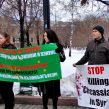
Grassroots Activism Among Circassians in Russia Remains on the Rise
Publication: Eurasia Daily Monitor Volume: 9 Issue: 222
By:

On December 2, over 100 people held a rally in downtown Moscow in support of Syria’s Circassians. The participants called on the Russian government to intervene and allow the estimated 100,000 ethnic Circassians who live in Syria to repatriate to the Russian North Caucasus. The rally was the biggest event so far held by Circassian activists in Moscow. The city authorities initially did not grant permission for the rally because it supposedly interfered in another country’s internal affairs, but permission was eventually granted for up to 300 participants (https://www.kavkaz-uzel.ru/articles/216604/). Circassian activists argue that the Russian law on compatriots entitles Syrian Circassians to Russian government assistance. However, Moscow has been reluctant to help the Circassian refugees, instead adopting a “wait-and-see” position. Apparently, Moscow does not want to antagonize the Circassians and other minorities but at the same time wants to avoid an increase in the size of the indigenous population of the North Caucasus through immigration.
The situation for the Circassians in Syria is fairly bleak. A video posted on YouTube showed unidentified people destroying a Circassian symbolic statue in one of the abandoned Circassian villages in the Golan Heights (https://aheku.org/page-id-3328.html). This could be an indication that the conflict in Syria is gradually turning into an ethnic conflict that will adversely impact the country’s minorities, including the 200,000 Circassians living in Syria.
“Today thousands of compatriots and citizens of the Russian Federation are on the brink of a humanitarian catastrophe and are killed in the zone of the military conflict in Syria,” a resolution by the Circassians in Moscow stated. “Russia, as a civilized state, is obliged to defend its citizens and compatriots, provide for their security and preserve their lives.” The activists demanded that the Russian government simplify the issuance of Russian visas to Russian compatriots, including the Circassians in Syria, and set up a resettlement program for them in Russia. The resolution also demanded that the leaders of the three republics in the North Caucasus where Circassians reside in large numbers—Kabardino-Balkaria, Karachaevo-Cherkessia and Adygea—stop pressuring Circassian activists (https://www.elot.ru/index.php?option=com_content&task=view&id=3116&Itemid=1).
Ironically, the Circassians currently appear to have far more rights to stage public protests in Moscow than back in the North Caucasus, where they mostly revert to one-man picketing that is sometimes halted by the police. Moscow is apparently much less concerned by a handful of protesters in a big city far removed from the Circassian homeland than by protests within the North Caucasus that might generate a large-scale public response from the local Circassian population.
According to the Circassian social scientist Naima Neflyasheva, who was a participant in the Moscow protest, the latest rally was unusual because for the first time it was organized not by well-known Circassian organizations, but rather by grass-root activists who used social networks to communicate with each other. It was obviously only a matter of time before the Circassians in Russia started to use social networks the same way they are used by Circassians outside Russia to organize and coordinate protests. Another important feature of the Moscow rally was that it attracted an unusually large number of women. The participation of women in public life is something that normally is lacking in the North Caucasus, Neflyasheva wrote (https://www.kavkaz-uzel.ru/blogs/1927/posts/13287).
Meanwhile, on December 2, President Vladimir Putin visited Turkey, where the situation in Syria was one of the main points discussed during talks with Turkish Prime Minister Recep Erdogan. According to Putin, Russian and Turkish assessments of the situation in Syria and the desirable outcome there “coincide, but the methods of getting to that point differ.” Putin further intrigued journalists by saying that during the discussions, “some new ideas came up that need further thinking and working out” (https://ria.ru/arab_sy/20121203/913255763.html). According to some reports, several Circassian activists managed to stage a protest near the site of Putin’s visit. After allowing them to read out their petition, the Turkish police arrested the activists.
As part of the worldwide campaign of Circassian activists on November 23–24, one-man pickets were held in Maikop, Adygea. The protesters tried to attract the attention of the Russian authorities to the Syrian Circassian issue. The city administration previously refused to grant permission for a mass rally on November 25 (https://www.kavkaz-uzel.ru/articles/216257/). On November 24, in the neighboring republic of Karachaevo-Cherkessia, two one-man pickets were held demanding the speedy repatriation of the Syrian Circassians. Only about 20 Circassians from Syria have been resettled in the republic. A one-man picket was held in Nalchik, Kabardino-Balkaria the same day, November 24, but ended when police briefly detained the activist and five bystanders who had gathered around him (https://www.kavkaz-uzel.ru/articles/216285/). The fact that even small protests in the Circassian-populated republics are being dispersed illuminates the sensitivity of the issue to Moscow. The Russian government realizes that this issue could provoke a large response from the Circassians in the North Caucasus and is trying to apply pressure selectively to dampen support for the idea and scare off would-be protesters.
In Adygea, the local government and civil activists compiled a list of 500 empty houses whose owners are willing to give them out to incoming Circassian repatriates for several years. So far, 65 Circassian families consisting of 252 people have resettled in Adygea, after escaping from conflict-ridden Syria. According to immigration service officials in the republic, out of the more than 240 refugees from Syria who applied for temporary residence permits in 2012, 110 received such permits (https://www.kavkaz-uzel.ru/articles/216527/).
Circassian grass roots activism in Russia appears to be maturing as the Russian authorities ignore the plight of the Syrian Circassians. The rise of activism among previously unknown Circassian figures also shows a certain degree of failure of the existing civil organizations to represent Circassian interests. Moscow’s position has not changed much, as Russian authorities for now pretend that they do not notice the Circassian issue.




